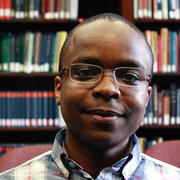
What is the subject of your thesis?
The subject of my thesis is Berkeley’s Immaterialism as presented primarily in his A Treatise Concerning the Principles of Human Knowledge. The topic of the thesis is in early modern history of philosophy although its subject matter intersects with metaphysics, philosophy of mind (perception), some epistemology and philosophy of science.
How did you decide on this topic?
I decided on this thesis topic because it is the area I had taken classes in and so felt comfortable approaching based on the knowledge base and skills I had acquired by the end of junior year. This is what I mean. In the summer of 2016, I was deciding between writing a thesis on ontology (because I had been thinking about the ontological argument with Bernhard Nickel since the Fall of my sophomore year) or Berkeley. But I felt I didn’t have the technical knowledge I needed to say anything interesting on ontology. So I decided to write on Berkeley. Ironically, as I was writing my thesis on Berkeley, I soon realized that I had met a kindred spirit. For he was asking the same questions as me – ‘what does ‘existence’ mean?’ for example. So I can’t really say I missed out on ontology! Lastly I was encouraged to pursue this topic by Alison Simmons. To this day, I am not sure what she saw in my short paper on Berkeley from Spring 2015. To me it was a routine assignment whose argument, I blush to admit, was not even sound (although I admit that I enjoyed writing it!) She thought I could develop the ideas in that paper further. So, I thought, “Why not?” The funny thing is that whereas I was dissenting from Berkeley back in the Spring 2015 and siding with Locke in that paper, by Spring 2017 I was siding with Berkeley and seeing all sorts of mistakes in Locke!
Who on the faculty are you working with and what has it been like?
I was working with Anat Schechtman as my thesis advisor. She is fantastic as a teacher and as a person! It was delightful to work with her not only because she gave very useful comments and feedback but she also availed a lot of resources to us during the Phil 124 class she taught. However, I feel that she made me work too hard! For she would press me to articulate more clearly on paper what to me seemed perfectly straightforward. I guess that’s the hard part of philosophy–saying what you mean so that others can see it as you do.
What have been the most rewarding aspects of writing your thesis?
The most rewarding aspects of the thesis writing project has been the research. I have never checked out so many books out of the library in my life! In the process I read everything I could get my hands on if it happened to be related to Berkeley. From Aristotle to Weyl – the one asking that timeless question ‘What is substance?’ two millennia ago the other responding today: there is no substance – and Berkeley in between, I read widely and wildly. I especially enjoyed Berkeley whose written prose and dialogue form made for very pleasant (sometimes even humorous) reading. The challenging thing about writing the thesis was learning when to stop reading and start writing! When I did get myself to start writing, the hard part was putting together all the bits of research material I had gathered into a coherent work of prose and citing the sources. As a thinker, I think I grew more critical and more open-minded. As a writer, I leave it to my readers to judge!
Do you have any advice for concentrators who are approaching the thesis writing stage?
Get a journal and start writing down your ideas. Good ideas are seldom retained unless you write them down. Anything counts as a good idea if it excites you and motivates so much that you to get of bed at 2am in order not to lose the thought.
